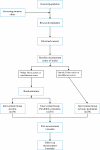Study protocol: EXERcise and cognition in sedentary adults with early-ONset dementia (EXERCISE-ON)
- PMID: 22897903
- PMCID: PMC3488467
- DOI: 10.1186/1471-2377-12-75
Study protocol: EXERcise and cognition in sedentary adults with early-ONset dementia (EXERCISE-ON)
Abstract
Background: Although the development of early-onset dementia is a radical and invalidating experience for both patient and family there are hardly any non-pharmacological studies that focus on this group of patients. One type of a non-pharmacological intervention that appears to have a beneficial effect on cognition in older persons without dementia and older persons at risk for dementia is exercise. In view of their younger age early-onset dementia patients may be well able to participate in an exercise program. The main aim of the EXERCISE-ON study is to assess whether exercise slows down the progressive course of the symptoms of dementia.
Methods/design: One hundred and fifty patients with early-onset dementia are recruited. After completion of the baseline measurements, participants living within a 50 kilometre radius to one of the rehabilitation centres are randomly assigned to either an aerobic exercise program in a rehabilitation centre or a flexibility and relaxation program in a rehabilitation centre. Both programs are applied three times a week during 3 months. Participants living outside the 50 kilometre radius are included in a feasibility study where participants join in a daily physical activity program set at home making use of pedometers. Measurements take place at baseline (entry of the study), after three months (end of the exercise program) and after six months (follow-up). Primary outcomes are cognitive functioning; psychomotor speed and executive functioning; (instrumental) activities of daily living, and quality of life. Secondary outcomes include physical, neuropsychological, and rest-activity rhythm measures.
Discussion: The EXERCISE-ON study is the first study to offer exercise programs to patients with early-onset dementia. We expect this study to supply evidence regarding the effects of exercise on the symptoms of early-onset dementia, influencing quality of life.
Trial registration: The present study is registered within The Netherlands National Trial Register (ref: NTR2124).
References
-
- Lambert JC, Amouyel P. Genetic heterogeneity of Azheimer's disease: Complexity and advances. Psychoneuroendocrinology. 2007;32(Suppl 1):S62–S70. - PubMed
Publication types
MeSH terms
LinkOut - more resources
Full Text Sources
Medical
Miscellaneous


